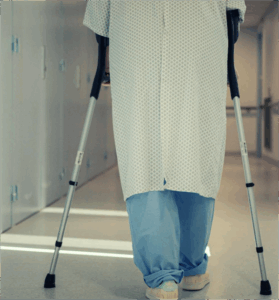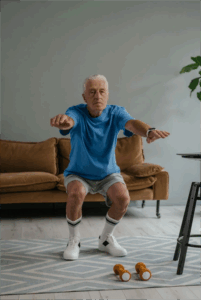Why Are The Elderly More Prone To Falling?
Can Falling Be Prevented?
Knowing how to age and not being afraid of aging is very healthy.” – Evelyn Lauder
Falls are one of the leading causes of injury among older adults.

According to the CDC, about one in four people aged 65 and older falls each year. These incidents often lead to serious consequences like fractures, head injuries, and loss of independence. But why are seniors more likely to fall? Are there steps that can be taken to reduce the risk?
Why are older adults more likely to fall?
There are several reasons why falls become more common with age:
- Loss of Muscle Strength and Balance – As people age, they naturally lose muscle mass and flexibility, which affects strength and balance. This decline makes it harder to recover from a misstep that could cause a fall or to stabilize yourself on uneven or slippery surfaces.
- Vision Changes – Aging eyes often struggle with depth perception, contrast sensitivity, and adapting to different lighting. Poor vision makes it harder to see obstacles or changes in the terrain, which increases the risk of tripping or stumbling.
- Medications – many older adults take multiple medications, some of which can cause dizziness, drowsiness, or low blood pressure. These side effects can contribute significantly to instability and falls.
- Chronic Health Conditions – Conditions such as arthritis, diabetes, Parkinson’s disease, or stroke can impair movement, coordination, or sensation in the arms and legs, all of which can make falls more likely.
- Unsafe Home Environments – Many falls happen in the home. Cluttered walkways, loose rugs, poor lighting, or lack of grab bars in key areas like bathrooms can all contribute to an increased risk.
How to prevent falls in the elderly…
The good news is that most falls are preventable. With some simple strategies and lifestyle adjustments, older adults can stay safe and maintain their independence.
 Stay Physically Active – Regular exercise, especially activities that improve strength and balance—like tai chi, walking, or water aerobics—can make a big difference in avoiding falls.
Stay Physically Active – Regular exercise, especially activities that improve strength and balance—like tai chi, walking, or water aerobics—can make a big difference in avoiding falls.- Even gentle stretching and resistance training can help maintain mobility and stability.
- Review Medications – It’s important to regularly review all medications with your healthcare provider or pharmacist.
- Some medications or drug interactions can increase risk of falling, and dosages may need to be adjusted over time.
- Get Regular Eye Exams – Your vision changes can happen gradually, so having annual eye exams is essential.
- Proper eyewear and up-to-date prescriptions help ensure that seniors can see hazards clearly.
- Make your Home Safer – Simple home modifications can dramatically reduce risk of falling. These include:
- Remove tripping hazards like cords and loose rugs
- Install grab bars in the bathroom
- Improve lighting throughout the house, especially in stairways and hallways
- Use non-slip mats in the shower and tub
- Keep walkways clear and clutter-free
- Use Assisting Devices if Needed – Canes, walkers, and handrails aren’t signs of weakness—they’re tools for independence and safety.
- If balance is an issue, using the right assistance device can prevent serious accidents.
- Wear Proper Footwear – Shoes are critical…they should be supportive, fit well, and have non-slip soles.
- Avoid walking around in socks or slippers with smooth bottoms that can slide easily on hard surfaces.
You Can Be Independent…
 Falls are a serious health concern for older adults, but they are not an inevitable part of aging.
Falls are a serious health concern for older adults, but they are not an inevitable part of aging.
By understanding the risk factors and taking proactive steps to address them, seniors and their caregivers can create safer environments and encourage habits that promote balance, strength, and confidence.
Fall prevention is something to take very seriously, it can mean the difference between maintaining independence and facing a long recovery—or even life-changing injuries.
A little awareness and action go a long way.
We are Certified Senior Move Managers recognized by our National Association of Senior Move Managers, NASMM! We are committed to serving our seniors with a high standard of ethics, best business practices and continuing education to help make whatever transition they are going through a Smooth Transition.
Contact us to learn how we can help you and/or your family with senior downsizing and moving anywhere in the Phoenix East Valley area, additionally we can assist if you are moving out of state.
We would love to serve you. 480-339-0011

No comments yet.